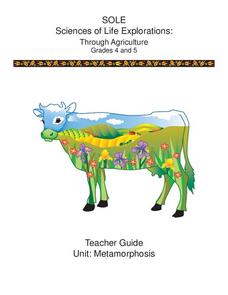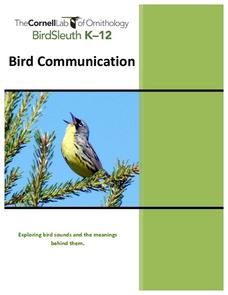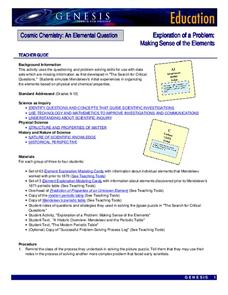Curated OER
Let's Get it Together! Reading to Learn
Let’s learn about frogs! Young readers are led through “Freaky Frogs,” a non-fiction article. Teach learners how to edit an article so there are fewer details to sift through. After talking through the article, they learn the six steps...
Curated OER
Survival Strategies and Adaptation in Insects
Third graders investigate insects and their adaptations that help them survive. For this survival strategies lesson, 3rd graders view photographs of insects and discuss the adaptations that each one uses to survive, including camouflage...
Core Knowledge Foundation
Insects Tell It Again!™ Read-Aloud Anthology
A read-aloud anthology explores the world of bees, wasps, beetles, termites, ants, fireflies, and more. Scholars listen to stories and discuss topics and practice word work. Extension opportunities keep the learning going in and out of...
Core Knowledge Foundation
The Human Body—Building Blocks and Nutrition Tell It Again!™ Read-Aloud Anthology
A read-aloud anthology explores the human body. Over three weeks, second graders listen to and discuss texts related to the cells, tissue, organs, digestive system, excretory system, nutrients, and a balanced diet. Learners practice word...
EngageNY
TASC Transition Curriculum: Workshop 15
What do a cheetah, Audi commercial, and air have in common? They're all topics of an engaging inquiry-based, hands-on workshop for educators about background knowledge, reading strategies, the CER model, and argumentative writing. The...
New York State Education Department
TASC Transition Curriculum: Workshop 7
Designed specifically for math instructors, the seventh workshop of a 15-part series allows time to explore Webb's DOK, ponder open-ended questions, and create lessons to apply what is learned. Teachers craft high-quality math problems...
Cornell University
Metamorphosis
Looking for an insect unit that addresses multiple skill strategies? Young entomologists explore multiple life cycles of insects that go through metamorphosis. The brainteasers and mobile activity spark learner interest before guiding...
Teach Engineering
Tissue Mechanics
Engage your class by showing them how silly putty and human tissues are alike. Pupils learn more about tissue mechanics by reflecting upon their experiences with silly putty. The lesson covers collagen, elastin, and proteoglycans and...
K12 Reader
Phases of the Moon
Take one giant leap for mankind with a reading passage about the moon. Kids learn about the lunar cycle with context clues and reading comprehension questions, making it a good informational text for your language arts lesson.
New York State Education Department
TASC Transition Curriculum: Workshop 3
Teachers turning into students? It's not Freaky Friday! It's a thoughtful workshop that teaches participants how to plan professional development for staff. Third in a 15-part series, the workshop provides a platform for the other...
K12 Reader
Why Does the Moon Orbit Earth?
Have you ever looked up at the moon and wondered why it looks different every night? Learn about the moon's orbit and the lunar cycle with a reading comprehension exercise. Using context clues, kids find the definitions of unfamiliar...
K12 Reader
Galileo and His Telescope
Learn about Galileo Galilei's contribution to modern science with a reading passage that focuses on reading comprehension. After kids read several paragraphs about his life, they answer five questions about the information they have just...
NASA
Lunar Rover
What is the shortest distance/time needed to complete a mission? Groups devise a strategy in order to determine the shortest distance and time connecting two points and a segment. They then use graphing, the distance formula, and a...
Curated OER
Introducing Microsoft Word
Students introduced to word processing by having them open a new document and use at least three to five commands within the program. Word processing commands are reinforced and practiced to gain more knowledge about entering and...
Curated OER
Memory and Learning
Students identify parts of the brain and what each part does. In this brain anatomy lesson, students participate in activities that focus on the job of each part of the brain co connect the task to the brain section. Students make a...
Curated OER
“THE LORAX” by Dr. Seuss
Few children's books convey the message of conservation as well as Dr. Seuss' The Lorax. Read the story aloud, emphasizing the interconnectedness of plants and animals in an ecosystem and discussing different ways people can help the...
Cornell Lab of Ornithology
Bird Communication
Sing for your dinner! Investigate the purpose of bird songs and strategies birds use to communicate. Through the lessons, individuals learn how to recognize different types of bird communication as well as hypothesize the purpose of...
Channel Islands Film
Arlington Springs Man: Lesson Plan 1
Learning to craft quality questions is a skill that can be taught. Class members use the Question Formulation Technique to learn how to create and refine both closed-ended and open-ended questions. They then view West of the West's...
NASA
Exploration of a Problem: Making Sense of the Elements
When given too much data to simply memorize, it helps to sort it into manageable groups. The second lesson in the six-part series of Cosmic Chemistry challenges groups of pupils to take a large amount of data and figure out how to best...
Core Knowledge Foundation
Rocks & Minerals
Take young geologists on an exploration of the rock cycle with this six-lesson earth science unit on rocks and minerals. Through a series of discussions, demonstrations, and hands-on investigations your class will learn about the...
Virginia Department of Education
Finding the Formula and Percent Composition
Do you have mole problems? If so, call Avogadro at 602-2140. The lesson plan starts with pupils working independently to solve for molar mass of ionic compounds. Then they learn to solve for percent composition and later perform an...
Rainforest Alliance
Investments in Forest Carbon
One hundred metric tons of CO2 can accumulate in one acre of forest over time—that's a lot of carbon! In the activity, groups of middle school learners determine what makes forests important. They then solidify the concept by using a...
Curated OER
Area & Perimeter
Learners define area and perimeter. They demonstrate understanding of the concepts concretely, with manipulatives, and describe with words, their strategies and thought processes.
Curated OER
Night of the Twister
Students use reading strategies for Night of the Twister. In this reading strategies lesson, students name five major catastrophes and books about each. Students complete a vocabulary section, make inferences and predictions, read the...

























